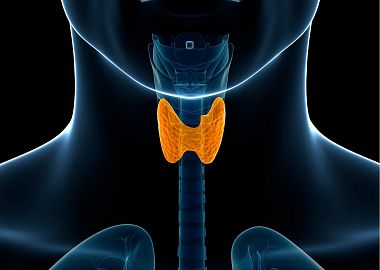Information about underactive thyroid gland

General
The function of the thyroid gland is to produce hormones. The most well known thyroid hormones are thyroxine (T4) and triiodothyronine (T3). These hormones are important for the body’s metabolic rate (how your cells use energy) and for growth. If your thyroid gland is unable to produce enough of these hormones, it is underactive. This is also called hypothyroidism. The most common cause of an underactive thyroid gland is an autoimmune condition (Hashimoto’s thyroiditis). Other causes include previous treatment for an overactive or enlarged thyroid gland (goiter), inflammation of the thyroid gland, and medication. Finally, an underactive thyroid may be congenital.
Symptoms
Physical symptoms and signs of an underactive thyroid gland include tiredness, feeling cold easily, dry skin, brittle nails, hair loss, weight gain, myxedema (swelling around the eyes or in lower legs), muscle weakness, muscle pain and stiffness, joint pain, shortness of breath, a hoarse voice, constipation, heavy menstrual periods, low heart rate, swelling in the neck (enlarged thyroid gland), and tingling in the hands.
Mental symptoms associated with an underactive thyroid may include depression, emotional instability, mental slowness, concentration problems, memory loss, nervousness, fatigue, anxiety, paranoia, aggressiveness, low self-esteem.
Testing and diagnosis
An underactive thyroid gland can be diagnosed with blood tests. The blood tests will be used to detect the presence of thyroid hormone (free T4) and the thyroid-stimulating hormone (TSH). In people with an underactive thyroid gland, the level of FT4 will be low and the TSH level high. Furthermore, certain antibodies (anti-TPO) can be measured. These are often elevated in people with Hashimoto’s thyroiditis.
Treatment
An underactive thyroid is best treated using synthetic hormone replacement tablets (levothyroxine).
Click here for the patient leaflet on hypothyroidism (Dutch) published by the Dutch Association for Endocrinology (NVE).
GeneralA goiter is an enlargement of the thyroid gland. This enlargement can be smooth and uniform (diffuse goiter) or it can be caused by one or more lumps within the gland (nodul...
GeneralLumps in the thyroid gland (called thyroid nodules) are common. About 8% of adults have a perceptible nodule in the thyroid gland. In fact, as many as 25-40% of the ad...
GeneralCancer is a group of malignant cells that can form a growth, also called a carcinoma. These cells invade the surrounding healthy tissue and/or break away and spread througho...
GeneralThe function of the thyroid gland is to produce hormones. The most well known thyroid hormones are thyroxine (T4) and triiodothyronine (T3). These hormones are important for...
GeneralPeople with Graves’ disease (overactive thyroid gland) may also develop eye problems. This is also called Graves’ orbitopathy or ophthalmopathy. The eye disease...